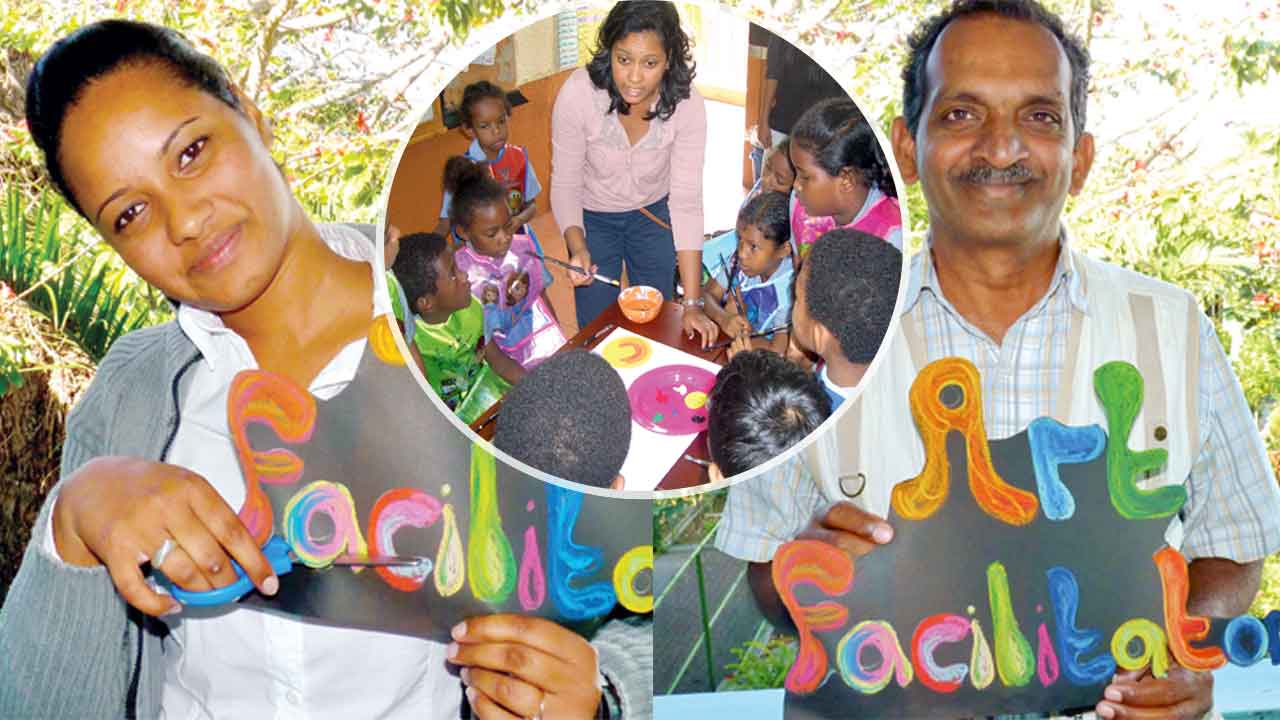Some people really stand out through their dedication to uplift the life of the less fortunate. Christelle Gopaul and Rowin Narraidoo are art facilitators of the creative classes at TIPA.
Their aim is to offer a different way of teaching to children from ZEP schools. They share their journey towards this noble cause.
Developing life skills and values through art and interactive pedagogy among vulnerable children – this is the main aim of not-for-profit organisation TIPA. Founded in 2007, TIPA’s vision is to create a dynamic society where citizens are engaged, the contribution of each one is valued and their differences are recognised.
Focusing its intervention in ZEP schools, TIPA believes that children living in poverty need more support and have to be given equal opportunities. The NGO thus aims to develop among vulnerable children, civic values such as cooperation, participation, respect for others, respect for regulations, among others.
[[{"type":"media","view_mode":"media_large","fid":"16688","attributes":{"class":"media-image aligncenter wp-image-28213","typeof":"foaf:Image","style":"","width":"542","height":"361","alt":"TIPA2015"}}]]
Rowin and Christelle, Drama and Visual Art facilitators respectively, are here to help those kids to develop and grow talents and life skills. “Those who benefit from these classes are primary school students from Standards 2 to 6, on a two-year basis. They all come from poverty-stricken families,” confides Rowin.
In fact, 360 children from 3 ZEP schools, namely Guy Rozemont Government School in Tranquebar, Vallijee Government School and Pointe aux Sables Government School, benefit from the creative classes. Teachers also benefit from the programme.
TIPA’s action is based on three core elements: Arts, Interactive Pedagogy and Life Skills. “It is essential that there is a good communication, and that the children appreciate what they are learning. Another important aspect is the collaboration with the teachers regarding the planning and conduction of all activities. We discuss about pedagogical tools and objectives.” This year, TIPA is collaborating with 16 teachers from the three schools.
Rowin explains that drama creative classes are being led both by a professional drama Art Facilitator and the class teacher. “Students are invited to express themselves freely within a framework whereby they have to abide by certain rules which they have themselves established, with the help of the Art Facilitator and the teacher. Theatre is used as a tool to help the children become responsible citizens who participate in the change for improvements in their community.”
Rowin and Christelle both strongly believe TIPA’s creative classes differ greatly from mainstream education. “Presently, children are not sufficiently encouraged to share ideas and opinions or develop critical thinking skills. Most of them spoon-fed. The creativity classes, on the other hand, encourages them to freely express themselves, since ‘participation’ is one of the life skills we aim to develop. During the activity, the child has the opportunity to say what he likes or dislikes, explain the reason behind, present his work to the class and talk about the difficulties he encountered,” shares Christelle.
[[{"type":"media","view_mode":"media_large","fid":"16689","attributes":{"class":"media-image aligncenter wp-image-28214","typeof":"foaf:Image","style":"","width":"563","height":"422","alt":"TIPA2015_1"}}]]
So how are the creativity classes being carried out? Christelle explains that the visual art classes have a specific structure which is important in the development of the children. “We start every class by rewarding each child with a blue star for their presence in the class. This first part is very important because we want them to feel that we are happy when they are present for the activity. Then, we spend a few minutes to talk about what was done in the previous session and to introduce the new theme for the present session… Then, we carry on with a demonstration to help children have a visual understanding of what will they have to create. At the end of the session, they present what they have done to the class and we conclude by encouraging them to share their views.
To conclude the class, the children, together with TIPA art facilitator and the teacher, review and assess the behaviour of each child with regards to the rules of the class (set up by the kids themselves at the beginning of the year) and they decide if the behavior of each child is worth a golden star. This positive reinforcement tool is there to encourage good behavior during the classes.”
Regarding drama classes, Rowin explains that 50 minutes are allocated to the lower primary classes (Std 2 and 3) and 75 minutes allocated upper primary classes (Std 4 to 6). “During these sessions, we make them aware of their rights and responsibilities in class. They learn the importance of participating: expressing their ideas and opinions. They also learn the importance of respecting their school mates and all those involved in the process of their learning and success,” he utters.
In line with the creative classes, a special teaching pedagogy is implemented and used to teach the vulnerable children. “Interactive Pedagogy is where students participate in their learning process,” explains Rowin. This approach, adds Christelle, encourages the child to engage in his learning process.
Since 2007, TIPA has worked with over 1,700 children and impacted over 600 teachers. Christelle wants the children to know that “they are good in what they do and they have to stand strong and be patient, not to be afraid to ask for help or to say that they have not understood, to keep asking questions and have a critical viewpoint on what they are leaning.”
She advises parents to not to slow down the ideas of their children, help them in their development and always promote a good parent-child communication, take some time to sit, talk and play together.
To the educators, she says: “A child spends more time with you than with his family, for many of them you will be a role model and the adult they trust in, so make of each class a world of surprise and motivation to learn and explore. Every day when you leave your pupils, feel you have done a good job!”
 Par
News on Sunday, Defimedia.info
Par
News on Sunday, Defimedia.info
 Par
News on Sunday, Defimedia.info
Par
News on Sunday, Defimedia.info

 J'aime
J'aime